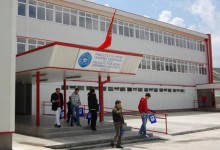Fakultet za sport i fizičko vaspitanje / Fizička kultura / TEORIJA MJERENJA U KINEZIOLOGIJI
| Naziv predmeta: | TEORIJA MJERENJA U KINEZIOLOGIJI |
| Šifra predmeta | Status predmeta | Semestar | Broj ECTS kredita | Fond časova (P+V+L) |
| 8223 | Obavezan | 1 | 7 | 5+0+0 |
| Studijski programi za koje se organizuje | Fizička kultura |
| Uslovljenost drugim predmetima | Nema uslova za prijavljivanje i služanje predmeta |
| Ciljevi izučavanja predmeta | Usvajanje znanja o strukturiranju i primjeni mjernih instrumenata u okviru kinezioloških istraživanja. |
| Ishodi učenja | Nakon što položi ovaj predmet, student će biti osposobljen da: razumije osnovne postavke kineziometrije; realizuje objektivna mjerenja sa različitim tipovima mjernih uređaja; određuje zonu pouzdanosti i procjenjuje grešku mjerenja; procjenjuje faktorsku valjanost, prediktivnu valjanost, utvrđuje valjanost pod regresionim, kanoničnim i diskriminativnim modelom. |
| Ime i prezime nastavnika i saradnika | |
| Metod nastave i savladanja gradiva | Predavanja, seminari, konsultacije, provjera znanja. |
| Plan i program rada |
|
Pripremne nedjelje - priprema i upis semestra I nedjelja, pred. - Uvodno predavanje I nedjelja, vježbe - II nedjelja, pred.-Teorijske postavke kineziometrije II nedjelja, vježbe III nedjelja, pred.- Mjerenje III nedjelja, vježbe - IV nedjelja, pred.- Objektivnost mjerenja kod različitih tipova mjernih instrumenata IV nedjelja, vježbe - V nedjelja, pred.- Klasični i Guttmanov model teorije mjerenja V nedjelja, vježbe - VI nedjelja, pred.- Kolokvijum I VI nedjelja, vježbe - VII nedjelja, pred.- Slobodna nedjelja VII nedjelja, vježbe - VIII nedjelja, pred.- Kondenzacija rezultata kompozitnih mjernih instrumenata VIII nedjelja, vježbe - IX nedjelja, pred.- Pouzdanost, Model interne konzistencije, Mjere pouzdanosti pod klasičnim , Harrisovi i image modelom IX nedjelja, vježbe - X nedjelja, pred.- Greška mjerenja i određivanje zona pouzdanosti X nedjelja, vježbe - XI nedjelja, pred.- Homogenost, Homogenost na osnovu prosječne korelacije, Homogenost pod kanoničkim i image mod. mj. XI nedjelja, vježbe - XII nedjelja, pred.- Faktorska valjanost, Predmeti mjer. U kineziološkim istraživ. Određivanje valjanosti pod razl. modelima XII nedjelja, vježbe - XIII nedjelja, pred.- Kolokvijum II XIII nedjelja, vježbe - XIV nedjelja, pred.- Prediktivna valjanost, Valjanost pod regresionim, kanoničkim i diskriminativnim modelom XIV nedjelja, vježbe - XV nedjelja, pred.- Validacija višekompozitnog testa XV nedjelja, vježbe - |
| Opterećenje studenta | Nedjeljno: 7 kredita x 40/30 = 9 sati Struktura: 5 sata teorijskog predavanja; 4 sati samostalnog rada; seminari uključujući konsultacije. U toku semestra: Nastava i završni ispit: 9 sati x 16 = 144 sati; Neophodne pripreme prije početka semestra (administracija, upis, ovjera) 2 x 9 sati) = 18 sati; Ukupno opterećenje za predmet 7x30 = 210 sati; Dopunski rad za pripremu ispita u popravnom ispitnom roku, uključujući i polaganje popravnog ispita od 0 do 48 sata (preostalo vrijeme od prve dvije stavke do ukupnog opterećenja za predmeti) Struktura opterećenja: 144 sati nastava i (Nastava)+18 sati.(Priprema)+48 sata(Dopun. rad) |
| Nedjeljno | U toku semestra |
| 7 kredita x 40/30=9 sati i 20 minuta
5 sat(a) teorijskog predavanja 0 sat(a) praktičnog predavanja 0 vježbi 4 sat(a) i 20 minuta samostalnog rada, uključujući i konsultacije |
Nastava i završni ispit:
9 sati i 20 minuta x 16 =149 sati i 20 minuta Neophodna priprema prije početka semestra (administracija, upis, ovjera): 9 sati i 20 minuta x 2 =18 sati i 40 minuta Ukupno opterećenje za predmet: 7 x 30=210 sati Dopunski rad za pripremu ispita u popravnom ispitnom roku, uključujući i polaganje popravnog ispita od 0 do 30 sati (preostalo vrijeme od prve dvije stavke do ukupnog opterećenja za predmet) 42 sati i 0 minuta Struktura opterećenja: 149 sati i 20 minuta (nastava), 18 sati i 40 minuta (priprema), 42 sati i 0 minuta (dopunski rad) |
| Obaveze studenta u toku nastave | Studenti su obavezni, da pohađaju nastavu, obrade zadate teme, polažu 2 kolokvijuma. |
| Konsultacije | |
| Literatura | Momirović, K.; B. Wolf i V. Popović (1999). Uvod u teoriju mjerenja: interne metrijske karakteristike kompozitnih mjernih instrumenata. FFK Priština. Bala, G., Stojanović, M., Stojanović, M. (2007). Mjerenje i definisanje motoričkih sposobnosti djece. Fakultet sporta i fizičkog vaspitanja Univerziteta u Novom Sadu. |
| Oblici provjere znanja i ocjenjivanje | Prisustvo nastavi, kolokvijumi, seminarski radovi, domaći radovi, testovi, završni ispit. Ocjene: E 51-60, D 61-70, C 71-80, B 81-90, A 91-100 |
| Posebne naznake za predmet | Nema |
| Napomena | Nema |
| Ocjena: | F | E | D | C | B | A |
| Broj poena | manje od 50 poena | više ili jednako 50 poena i manje od 60 poena | više ili jednako 60 poena i manje od 70 poena | više ili jednako 70 poena i manje od 80 poena | više ili jednako 80 poena i manje od 90 poena | više ili jednako 90 poena |
Fakultet za sport i fizičko vaspitanje / Fizička kultura / METODE ZA ANALIZU PODATAKA U KINEZIOLOGIJI
| Naziv predmeta: | METODE ZA ANALIZU PODATAKA U KINEZIOLOGIJI |
| Šifra predmeta | Status predmeta | Semestar | Broj ECTS kredita | Fond časova (P+V+L) |
| 8224 | Obavezan | 1 | 7 | 5+0+0 |
| Studijski programi za koje se organizuje | Fizička kultura |
| Uslovljenost drugim predmetima | Nema uslova za prijavljivanje i služanje predmeta |
| Ciljevi izučavanja predmeta | Usvajanje znanja o samostalnom naučno-istraživačkom radu, analize multivarijanih statističkih metoda, praćenju literature i primjeni usvojenih znanja., |
| Ishodi učenja | Nakon što student položi ovaj ispit, biće u mogućnosti da: 1. Prepoznaje teorijske postavke, standardne metode i alate za analizu podataka koji se primjenjuju u istraživanjima u sportu i fizičkom vaspitanju. 2. Analizira testiranje normalnosti distribucije, procjenu normalnosti distribucije, procjenu intervala pouzdanosti i populacijskih parametara, nezavisni i zavisni T-test. 3. Koristi Multivarijantne statističke metode: Faktorska analiza, Taksonomska analiza, Regresiona analiza, Kanonička korelaciona analiza,ANOVA/MANOVA; ANKOVA/MANKOVA, kanoničku korelacijsku analizu, analizu glavnih komponenata i klaster analizu. 4. Interpretira obradu podataka i rezultate istraživanja. 5.Samostalno kreira i rješava istraživačke probleme u sportu i fizičkom vaspitanju. 6. Odabira statističke metode i postupke, njihovu validnu realizaciju i interpretaciju. |
| Ime i prezime nastavnika i saradnika | Prof. dr Dobrislav Vujović, Prof. dr Branimir Mikić. |
| Metod nastave i savladanja gradiva | Predavanja, seminari, konsultacije, provjera znanja. |
| Plan i program rada |
|
Pripremne nedjelje - priprema i upis semestra I nedjelja, pred. - Linearna algebra I nedjelja, vježbe - II nedjelja, pred.-Vektorski prostor, Linearna kombinacija vektora, II nedjelja, vježbe III nedjelja, pred.- Linearna nezavisnost vektora III nedjelja, vježbe - IV nedjelja, pred.- Dimenzija prostora, Podprostor. IV nedjelja, vježbe - V nedjelja, pred.- Preslikavanje vektorskih prostora, Linearna preslikavanja, Algebra preslikavanja V nedjelja, vježbe - VI nedjelja, pred.- Kolokvijum I VI nedjelja, vježbe - VII nedjelja, pred.- Multivarijantne statističke metode VII nedjelja, vježbe - VIII nedjelja, pred.- Faktorska analiza, Taksonomska analiza VIII nedjelja, vježbe - IX nedjelja, pred.- Regresiona analiza, Kanonička korelaciona analiza IX nedjelja, vježbe - X nedjelja, pred.- ANOVA/MANOVA; ANKOVA/MANKOVA, Kanonička diskriminativna analiza X nedjelja, vježbe - XI nedjelja, pred.- Kanonička analiza promjena, Analiza krive razvoja XI nedjelja, vježbe - XII nedjelja, pred.- Kolokvijum II XII nedjelja, vježbe - XIII nedjelja, pred.- Metode za utvrđivanje homogenih skupova XIII nedjelja, vježbe - XIV nedjelja, pred.- Rekapitulacija nastavnih sadržaja XIV nedjelja, vježbe - XV nedjelja, pred.- Završni ispit XV nedjelja, vježbe - |
| Opterećenje studenta | Nedjeljno 7 kredita x 40/30 = 9 sati Struktura opterećenja: 5 sata teorijskog predavanja 4 sati samostalnog rada, seminari uključujući konsultacije U toku semestra Nastava i završni ispit: 9 sati x 16 = 144 sati Neophodne pripreme prije početka semestra (administracija, upis, ovjera) 2 x 9 sati) = 18 sati Ukupno opterećenje za predmet 7x30 = 210 sati Dopunski rad za pripremu ispita u popravnom ispitnom roku, uključujući i polaganje popravnog ispita od 0 do 48 sata (preostalo vrijeme od prve dvije stavke do ukupnog opterećenja za predmeti) Struktura opterećenja: 144 sati nastava i (Nastava)+18 sati.(Priprema)+48 sata(Dopun. rad) |
| Nedjeljno | U toku semestra |
| 7 kredita x 40/30=9 sati i 20 minuta
5 sat(a) teorijskog predavanja 0 sat(a) praktičnog predavanja 0 vježbi 4 sat(a) i 20 minuta samostalnog rada, uključujući i konsultacije |
Nastava i završni ispit:
9 sati i 20 minuta x 16 =149 sati i 20 minuta Neophodna priprema prije početka semestra (administracija, upis, ovjera): 9 sati i 20 minuta x 2 =18 sati i 40 minuta Ukupno opterećenje za predmet: 7 x 30=210 sati Dopunski rad za pripremu ispita u popravnom ispitnom roku, uključujući i polaganje popravnog ispita od 0 do 30 sati (preostalo vrijeme od prve dvije stavke do ukupnog opterećenja za predmet) 42 sati i 0 minuta Struktura opterećenja: 149 sati i 20 minuta (nastava), 18 sati i 40 minuta (priprema), 42 sati i 0 minuta (dopunski rad) |
| Obaveze studenta u toku nastave | : Studenti su obavezni, da pohađaju nastavu, obrade zadate teme, polažu 2 kolokvijuma. |
| Konsultacije | petkom od 13.00 sati (kabinet) |
| Literatura | Literatura: Malacko, j., Popović, D. (1997). Metodologija kineziološko antropoloških istraživanja. Fakultet za fiz. Kult., Univerziteta u Prištini. Manly, B.F.J. (1994). Multivariate Statistical Methods. A primer. II ed. London: Champan&Hall. |
| Oblici provjere znanja i ocjenjivanje | Prisustvo nastavi, kolokvijumi, seminarski radovi, domaći radovi, testovi, završni ispit. Ocjene: E (51-60); D (61-70), C (71-80); B (81-90); a (91-100) |
| Posebne naznake za predmet | Nema |
| Napomena | Plan realizacije po tematskim cjelinama i terminima studenti će dobiti na početku semestra |
| Ocjena: | F | E | D | C | B | A |
| Broj poena | manje od 50 poena | više ili jednako 50 poena i manje od 60 poena | više ili jednako 60 poena i manje od 70 poena | više ili jednako 70 poena i manje od 80 poena | više ili jednako 80 poena i manje od 90 poena | više ili jednako 90 poena |
Fakultet za sport i fizičko vaspitanje / Fizička kultura / METODOLOGIJA KINEZIOLOŠKIH ISTRAŽIVANJA
| Naziv predmeta: | METODOLOGIJA KINEZIOLOŠKIH ISTRAŽIVANJA |
| Šifra predmeta | Status predmeta | Semestar | Broj ECTS kredita | Fond časova (P+V+L) |
| 8222 | Obavezan | 1 | 8 | 5+0+0 |
| Studijski programi za koje se organizuje | Fizička kultura |
| Uslovljenost drugim predmetima | Nema uslova za prijavljivanje i slušanje predmeta |
| Ciljevi izučavanja predmeta | Cilj predmeta je upoznavanje studenata sa načelima istraživanja u području kineziologije, vrstama i kategorijama publikacija u kineziologiji. Kroz predmet studenti se upoznaju sa pripremom rukopisa za naučne časopise i izradu doktorske disertacije. |
| Ishodi učenja | Nakon što student položi ovaj ispit, biće u mogućnosti da: 1. Samostalno pretražuje literaturu; 2. Samostalno provode i organizuju izradu naučnih i stručnih radova sa različitim temama. 3. Samostalno i kritički sagledava sve aspekte planiranja i izrade projekta doktorske disertacije; 4. Samostalno priprema rukopis za doktorsku disertaciju; |
| Ime i prezime nastavnika i saradnika | Prof.dr Rašid Hadžić |
| Metod nastave i savladanja gradiva | Predavanja,vježbe,seminarski radovi, konsultacije,provjera |
| Plan i program rada |
|
Pripremne nedjelje - priprema i upis semestra I nedjelja, pred. - - Vrste i kategorije naučnih publikacija u kineziologiji. I nedjelja, vježbe - II nedjelja, pred.- - Kriterijumi za registrovanje naučnog časopisa (Impact Factor, citatne baze, citiranost, kriterijumi za odredjivanje kategorije naučnih publikacija) II nedjelja, vježbe III nedjelja, pred.- - Etička pitanja u naučno istraživačkom radu III nedjelja, vježbe - IV nedjelja, pred.- - Standard za pisanje naučnoistraživačkog rada IV nedjelja, vježbe - V nedjelja, pred.- - Neophodne aktivnosti u procesu pripreme rukopisa naučnog članka V nedjelja, vježbe - VI nedjelja, pred.- - Kolokvijum I VI nedjelja, vježbe - VII nedjelja, pred.- - Pretraživanje literature VII nedjelja, vježbe - VIII nedjelja, pred.- - Sistematsko izlaganje materije i ideje (uvod, metod, rezultati, diskusija) VIII nedjelja, vježbe - IX nedjelja, pred.- - Priprema rukopisa za nacionalni naučni časopis IX nedjelja, vježbe - X nedjelja, pred.- - Priprema rukopisa za internacionalni naučni časopis X nedjelja, vježbe - XI nedjelja, pred.- - Priprema rukopisa za poster prezentaciju XI nedjelja, vježbe - XII nedjelja, pred.- - Kolokvijum II XII nedjelja, vježbe - XIII nedjelja, pred.- - Priprema rukopisa za doktorske disertacije XIII nedjelja, vježbe - XIV nedjelja, pred.- -Uputstva za izradu projekta doktorske disertacije - Uputstva za pisanje doktorske disertacije XIV nedjelja, vježbe - XV nedjelja, pred.- - Završni ispit. XV nedjelja, vježbe - |
| Opterećenje studenta | nedjeljno 5 kredita x 40I30 = 6,40 sati 3 sata predavanja 3,40 sata samostalnog rada uključujući i konsultacije u semestru Nastava i završni ispit 6,40 sati x 16 = 106,40 sati Priprema (administracija, upis, ovjera) 2 x 5,30 = 11 sati Ukupno opterećenje za predmet 5 x 30 = 150 sati Dopunski rad za pripremu ispita od 0 do 24 sata Struktura opterećenja: Nastava 85+ priprema 11+ doponski rad 24 sata |
| Nedjeljno | U toku semestra |
| 8 kredita x 40/30=10 sati i 40 minuta
5 sat(a) teorijskog predavanja 0 sat(a) praktičnog predavanja 0 vježbi 5 sat(a) i 40 minuta samostalnog rada, uključujući i konsultacije |
Nastava i završni ispit:
10 sati i 40 minuta x 16 =170 sati i 40 minuta Neophodna priprema prije početka semestra (administracija, upis, ovjera): 10 sati i 40 minuta x 2 =21 sati i 20 minuta Ukupno opterećenje za predmet: 8 x 30=240 sati Dopunski rad za pripremu ispita u popravnom ispitnom roku, uključujući i polaganje popravnog ispita od 0 do 30 sati (preostalo vrijeme od prve dvije stavke do ukupnog opterećenja za predmet) 48 sati i 0 minuta Struktura opterećenja: 170 sati i 40 minuta (nastava), 21 sati i 20 minuta (priprema), 48 sati i 0 minuta (dopunski rad) |
| Obaveze studenta u toku nastave | Studenti su obavezni da pohađaju nastavu, obrade zadate teme, položu 2 kolokvijuma, rade vježbe i seminarski rad . |
| Konsultacije | ponedeljak u 10 h |
| Literatura | Bala, G. (1986): Logičke osnove metoda za analizu podataka iz istraživanja u fizičkoj kulturi. Novi Sad.; Perić, D. (2006): Metodologija naučnih istraživanja, Novi Sad.; Malacko, J., D. Popović (2001): Metodologija kineziološko antropoloških istraživanja, Leposavić.; Mijanović, M. (2000): Izbor statističkih metoda, Podgorica.; Radjo, I., B. Wolf, M. Hadžikadunić (1999): Kompjuter u sportu, Sarajevo. Bala. G. (2008). Uspešno pisanje u kineziologiji. Novi Sad. |
| Oblici provjere znanja i ocjenjivanje | Dva kolokvijuma po 20 poena. Seminarski rad 5 poena. Domaći zadatak 5 poena. Završni ispit 50 poena. Prelazna ocjena se dobija ako se kumulativno skakupi najmanje 51 poen. Ocjene: E 51 – 60; D 61 – 70 ; C 71 – 80 ; B 81 – 90 ; A 91 – 1 |
| Posebne naznake za predmet | Nema |
| Napomena | Nema |
| Ocjena: | F | E | D | C | B | A |
| Broj poena | manje od 50 poena | više ili jednako 50 poena i manje od 60 poena | više ili jednako 60 poena i manje od 70 poena | više ili jednako 70 poena i manje od 80 poena | više ili jednako 80 poena i manje od 90 poena | više ili jednako 90 poena |
Fakultet za sport i fizičko vaspitanje / Fizička kultura / MOTORIČKO UČENJE
| Naziv predmeta: | MOTORIČKO UČENJE |
| Šifra predmeta | Status predmeta | Semestar | Broj ECTS kredita | Fond časova (P+V+L) |
| 8225 | Obavezan | 1 | 8 | 5+0+0 |
| Studijski programi za koje se organizuje | Fizička kultura |
| Uslovljenost drugim predmetima | Nema uslova za prijavljivanje i služanje predmeta |
| Ciljevi izučavanja predmeta | Usvajanje znanja o modelima motoričkog učenja i vježbanja, savladavanju motoričkih vještina, kao i sprovođenju istraživanja u ovom polju. |
| Ishodi učenja | Po završetku ovog predmeta student će moći da: 1. Objašnjava pojam i strukturu motoričkog ponašanja 2. Objašnjava pojmove motoričkog razvoja, kontrole i učenja 3. Klasifikuje i interpretira savremena istraživanja iz oblasti motoričkog učenja 4. Organizuje izradu naučnih i stručnih radova na temu motoričkog učenja. 5. Kritički sagledava sve aspekte organizacije izrade stručnih i naučnih radova na temu motoričkog učenja |
| Ime i prezime nastavnika i saradnika | prof. dr Kemal Idrizović |
| Metod nastave i savladanja gradiva | Predavanja, seminari, konsultacije, provjera znanja. |
| Plan i program rada |
|
Pripremne nedjelje - priprema i upis semestra I nedjelja, pred. - Teorije učenja I nedjelja, vježbe - II nedjelja, pred.-Motoričko učenje, Definisanje i klasifikacija motoričkih vještina II nedjelja, vježbe III nedjelja, pred.- Motoričke sposobnosti III nedjelja, vježbe - IV nedjelja, pred.- IV nedjelja, vježbe - Procesuiranje informacija i donošenje odluka V nedjelja, pred.- V nedjelja, vježbe - Kolokvijum I VI nedjelja, pred.- VI nedjelja, vježbe - VII nedjelja, pred.- Teorije motoričkih programa VII nedjelja, vježbe - VIII nedjelja, pred.- Izvođenje pokreta i motorički programi VIII nedjelja, vježbe - IX nedjelja, pred.- Biomehanički aspekt motoričkog učenja IX nedjelja, vježbe - X nedjelja, pred.- Modelovanje senzorno-motoričkog sistema X nedjelja, vježbe - XI nedjelja, pred.- Sportske vještine i motoričko učenje XI nedjelja, vježbe - XII nedjelja, pred.- Kolokvijum II XII nedjelja, vježbe - XIII nedjelja, pred.- Protok informacije i uspjeh u motoričkom učenju XIII nedjelja, vježbe - XIV nedjelja, pred.- Strukturiranje motoričke edukacije XIV nedjelja, vježbe - XV nedjelja, pred.- Završni ispit XV nedjelja, vježbe - |
| Opterećenje studenta | Nedjeljno 8 kredita x 40/30 = 10 sati Struktura: 5 sata teorijskog predavanja 5 sati samostalnog rada, seminara, uključujući konsultacije U toku semestra Nastava i završni ispit: 10 sati x 16 = 160 sati Neophodne pripreme prije početka semestra (administracija, upis, ovjera) 2 x 10 sati) = 20 sati Ukupno opterećenje za predmet 8x30 = 240 sati Dopunski rad za pripremu ispita u popravnom ispitnom roku, uključujući i polaganje popravnog ispita od 0 do 60 sata (preostalo vrijeme od prve dvije stavke do ukupnog opterećenja za predmeti) Struktura opterećenja: 160 sati nastava i (Nastava)+20 sati.(Priprema)+60 sata(Dopun. rad) |
| Nedjeljno | U toku semestra |
| 8 kredita x 40/30=10 sati i 40 minuta
5 sat(a) teorijskog predavanja 0 sat(a) praktičnog predavanja 0 vježbi 5 sat(a) i 40 minuta samostalnog rada, uključujući i konsultacije |
Nastava i završni ispit:
10 sati i 40 minuta x 16 =170 sati i 40 minuta Neophodna priprema prije početka semestra (administracija, upis, ovjera): 10 sati i 40 minuta x 2 =21 sati i 20 minuta Ukupno opterećenje za predmet: 8 x 30=240 sati Dopunski rad za pripremu ispita u popravnom ispitnom roku, uključujući i polaganje popravnog ispita od 0 do 30 sati (preostalo vrijeme od prve dvije stavke do ukupnog opterećenja za predmet) 48 sati i 0 minuta Struktura opterećenja: 170 sati i 40 minuta (nastava), 21 sati i 20 minuta (priprema), 48 sati i 0 minuta (dopunski rad) |
| Obaveze studenta u toku nastave | Studenti su obavezni, da pohađaju nastavu, obrade zadate teme, polažu 2 kolokvijuma. |
| Konsultacije | |
| Literatura | Schmidt, R., Wrisberg, C. (2004). Motor learning and performance. Champaign IL: Human Kinetics. Schmidt, R.A., Lee, T. (1998). Motor control and learning a behavioural emphasis. Champaign IL: Human Kinetics. |
| Oblici provjere znanja i ocjenjivanje | Prisustvo nastavi, kolokvijumi, seminarski radovi, domaći radovi, testovi, završni ispit. Ocjene: E (51-60); D (61-70); C (71-80); B (81-90); A (91-100). |
| Posebne naznake za predmet | Nema |
| Napomena | Nema |
| Ocjena: | F | E | D | C | B | A |
| Broj poena | manje od 50 poena | više ili jednako 50 poena i manje od 60 poena | više ili jednako 60 poena i manje od 70 poena | više ili jednako 70 poena i manje od 80 poena | više ili jednako 80 poena i manje od 90 poena | više ili jednako 90 poena |











